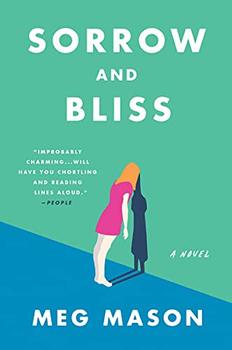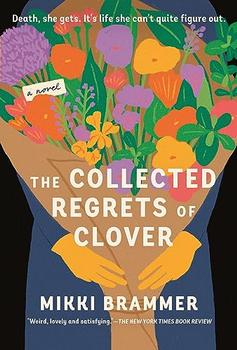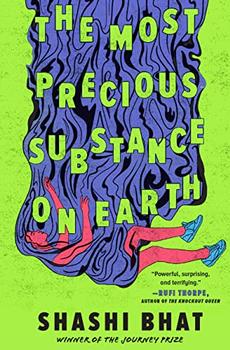Summary | Excerpt | Reviews | Beyond the book | Read-Alikes | Genres & Themes | Author Bio

At the opening of Meg Mason's Sorrow and Bliss, Martha's marriage is disintegrating. When she was 17, "a little bomb went off" in her brain — a sudden, violent onset of mental illness that has characterized her life ever since. Now she is middle-aged, and a resurgent wave of that same illness is threatening to wipe her out. The pain is causing her to lash out at her husband, Patrick. She rebuffs his incessant cheerfulness with small cruelties, pushing him further and further away. When he eventually leaves her, it isn't exactly a shock, but the event causes her to reflect on everything that has led up to this final blow. Written with wit and compassion, Sorrow and Bliss recounts Martha's attempt to sift through the debris of her life in order to gain some understanding of herself and to seek out the source of her damage.
Mason has imbued Martha with a glittering intelligence, laser-like powers of observation and a deliciously bone-dry sense of humor. Her pithy, deadpan comments fly like sparks from the page. Whilst the book's content is not exactly ground-breaking, its sharp comedy makes it feel fresh. The author also draws striking attention to the delicate, transitory details of everyday life — Martha appreciates, for example, the way a passing cloud makes the light flicker on her sister's face, and the way the veins in her husband's hands bulge as he grips the steering wheel. The precision of Mason's description elevates otherwise mundane scenes into something that feels extraordinary.
The novel also provides a colorful cast of secondary characters in the form of Martha's family, who are fleshed out in recollections of her youth. She comes from a household of artists — her mother is a "minorly important" sculptor and her father is a poet who, though once called the male Sylvia Plath, hasn't published anything since he was 19. On the surface, this makes for a romantic, bohemian childhood spent in a run-down London townhouse, where her mother throws extravagant parties full of creative and interesting people. However, in reality the family is poor, surviving mainly through the patronage of Martha's aunt, Winsome — a dependency that causes resentment and tensions. Martha's main source of solace is her sister Ingrid, whose jolly cajoling and upbeat personality are often the only balm for her growing sense of despair.
It is at Winsome's house that Martha first meets Patrick, who comes for Christmas as a guest when she is 16. Having been shipped away to boarding school as a young child immediately after the death of his mother, Patrick has wounds of his own. He is sweet and soft-spoken. His initial kindness to Martha is the seed of their later relationship — he is attracted by her fiery intelligence, she by his calm and gentle approach to life. However, the same qualities that draw her to him eventually become a source of bitter discontent. Frustrated by his perceived lack of engagement with her pain, she begins to hate him for being "so kind, and obedient, and oblivious."
As the novel progresses, Martha charts the experience of her relationship with Patrick and its eventual decline. Through recalling memories of their life together, she realizes how much she values and loves him, and how much she wants him to return — though she worries that this realization might have come too late. As she delves into her past, she also recounts the effects that her illness has had on her family — and the effects, both positive and negative, that her family has had on her own development. The denouement is one of hope, suggesting that despite all the suffering, it might be possible to rebuild.
Sorrow and Bliss touches on many issues surrounding mental illness: its heritability, its destructive effects and the potentially disastrous consequences of misdiagnosis. Mason explores the suppression of past mental illness within families, and the damage and misunderstanding this can cause as the same problems ravage successive generations. Secrecy and denial, she seems to suggest, are obstacles to finding relief.
Despite the weight of its subject matter, Sorrow and Bliss manages to be sharp and entertaining throughout, whilst always remaining sensitive to the difficult topics it confronts. In a stroke of genius, Mason does not reveal the true nature of Martha's illness — it is presented as simply "- -." This enables us to listen to her without pathologizing, or chalking up her perceptions to her condition. It also puts us in the same position as Martha — in the dark, attempting to reach the light of understanding.
![]() This review was originally published in The BookBrowse Review in March 2021, and has been updated for the
March 2022 edition.
Click here to go to this issue.
This review was originally published in The BookBrowse Review in March 2021, and has been updated for the
March 2022 edition.
Click here to go to this issue.

If you liked Sorrow and Bliss, try these:

The Collected Regrets of Clover
by Mikki Brammer
Published 2024
Mikki Brammer's The Collected Regrets of Clover is a big-hearted and life-affirming debut about a death doula who, in caring for others at the end of their life, has forgotten how to live her own, for readers of The Midnight Library.

The Most Precious Substance on Earth
by Shashi Bhat
Published 2023
Journey Prize winner Shashi Bhat's sharp, darkly comic, and poignant story about a high school student's traumatic experience and how it irrevocably alters her life, for fans of 13 Ways of Looking at a Fat Girl, Girlhood, and Pen15.
Your guide toexceptional books
BookBrowse seeks out and recommends the best in contemporary fiction and nonfiction—books that not only engage and entertain but also deepen our understanding of ourselves and the world around us.